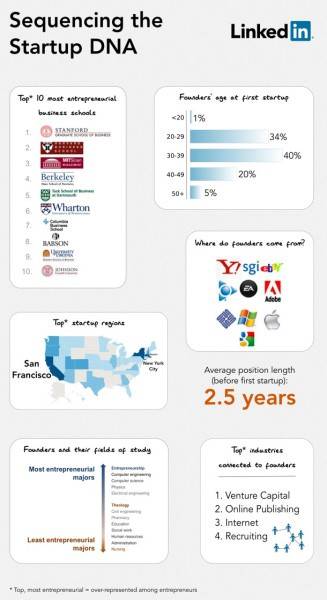One of LinkedIn’s greatest advantages is that it has a wealth of data on the workforce. It can take that data and analyze market segments to find trends of who works in a specific industry, what kind of education they have, what their background is, who they know, where they are from and so on. This morning LinkedIn released an infographic studying entrepreneurs and how they came to their position if life.

LinkedIn says it is “Sequencing the Startup DNA.” Unsurprisingly, the top three schools that startup founders come from are Stanford, Harvard and MIT Sloan. Yet, LinkedIn goes on to dispel a myth of startup founders that concoct their ideas to change the world from their dorm rooms.
LinkedIn’s data shows that 65% of startup founders are over the age of 30. Their average position length before their first startup is 2.5 years and they come from the some of the biggest tech companies in the land including Apple, Adobe, Electronic Arts, Google, Yahoo and Microsoft.
From a social perspective, founders are disproportionately connected to venture capitalists, bloggers and recruiters. This makes sense as those are the types of connections that founders will need to get money, get the word out and get the top talent to work at their companies. It show the value of the LinkedIn network in a specific industry. It is likely the same for other industries.
Here is a note from LinkedIn on how it identifies founders:
Startup Founders are LinkedIn professionals who identify themselves as founders (or co-founders) of U.S. companies created after 2000, with a LinkedIn company profile, and that currently have between 2 – 200 employees. We have excluded small law, consulting and real estate firms, as well as LLCs (limited liability companies) – and assembled a pool of over 13,000 entrepreneurs. We then compared them with the average LinkedIn member and highlight characteristics that disproportionately appear among startup founders.
Check out the infographic below. Entrepreneurs and founders: how closely does LinkedIn’s data mirror your own experience?

















